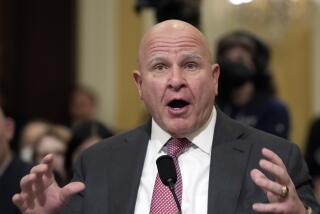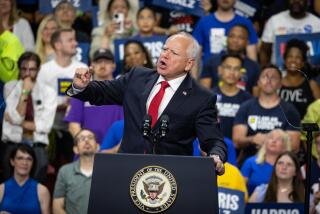Ex-officers ask Musharraf to resign
- Share via
KARACHI, PAKISTAN — President Pervez Musharraf should immediately step down as a way to promote democracy, combat religious militancy and restore the reputation of Pakistan’s military, according to an influential group of retired officers.
The Pakistan Ex-Servicemen’s Society made its demands late Tuesday, two days after Musharraf left on an eight-day European swing to assure world leaders that Pakistan -- and its nuclear arsenal -- is in safe hands.
“This is in the supreme national interest and it makes it incumbent on him to step down,” said a statement released after a meeting in Rawalpindi of the retired officers, including two dozen army generals, three air marshals and eight admirals.
The call for Musharraf’s resignation was quickly dismissed Wednesday by the government.
“What these people say amounts to nothing,” said retired army Maj. Gen. Rashid Qureshi, now a spokesman for Musharraf.
“They call themselves retired military personnel. But they’re just self-appointed people who have been fluctuating between political parties. It’s clearly a political move.”
Western diplomats also reacted Wednesday, noting that the meeting of the retired military group was one of the largest assembled to speak out against Musharraf.
“I can’t say it’s significant but it’s certainly unusual,” said one diplomat who requested anonymity. “It certainly shows the great concern the military in Pakistan has over its reputation.”
Musharraf took office in 1999 in a bloodless military coup. After the Sept. 11 attacks, he became a top ally in the Bush administration’s campaign against terrorism. He was commander of the army until stepping down in late November.
Pakistan has experienced widespread civil unrest since Musharraf suspended the nation’s top Supreme Court judge in March, and has seen protracted battles with religious insurgents and Taliban guerrillas along the country’s mountainous border with Afghanistan.
Opposition leader Benazir Bhutto was assassinated Dec. 27 in Rawalpindi, Pakistan’s military garrison town, after a campaign rally for parliamentary elections that had been scheduled for early this month. Many blame Musharraf’s administration for the killing, saying that at the very least, it failed to provide her with adequate security. The elections have been rescheduled for Feb. 18.
The letter released by the ex-military members was the Pakistani leader’s latest embarrassment. Though the group does not officially speak for serving officers, several of those who attended the recent meeting said many current officers privately support them.
“The message is that Musharraf is the problem,” said Talat Masood, a prominent political analyst and retired general who attended the gathering. “The sooner he realizes it, the better it will be for the country and the armed forces.
“The army is getting a bad name because of his performance and the way he has involved the military in politics. He’s doing irreparable damage.”
Gen. Ashfaq Kiani, who replaced Musharraf as chief of the military, has disengaged the army from politics but remains loyal to the president, analysts say. Recently, Kiani has banned officers from maintaining contacts with politicians, ordering that officers serving in civil posts and government-run enterprises return to their military duties.
On Tuesday, the day the ex-servicemen signed their letter calling for Musharraf’s resignation, Kiani held security talks with Adm. William J. Fallon, head of U.S. Central Command and the top commander of American forces in the Middle East.
Demands for change by retired military personnel are not unique to Pakistan. Former generals and enlisted men in the U.S. have criticized the armed forces’ involvement in the war in Iraq, experts say.
Musharraf met Wednesday with U.S. Secretary of State Condoleezza Rice on the sidelines of the World Economic Forum in Davos, Switzerland. She pressed him to hold free and fair elections, the Associated Press reported. He has assured leaders that Pakistan is not a “banana republic” and has pledged that the country’s nuclear arsenal will not fall into the hands of terrorists.
Meanwhile, he has said Western powers should not hold Pakistan to unrealistic standards regarding issues such as human rights.
At home, there are shortages of wheat and flour and officials have recently considered issuing rationing cards.
Masood, the analyst, said the ex-military men had called for the meeting after watching events with great concern.
“We are with the rest of the nation in its opposition to President Musharraf,” he said. “We are no way a party to what he is doing.”
--
More to Read
Sign up for Essential California
The most important California stories and recommendations in your inbox every morning.
You may occasionally receive promotional content from the Los Angeles Times.














